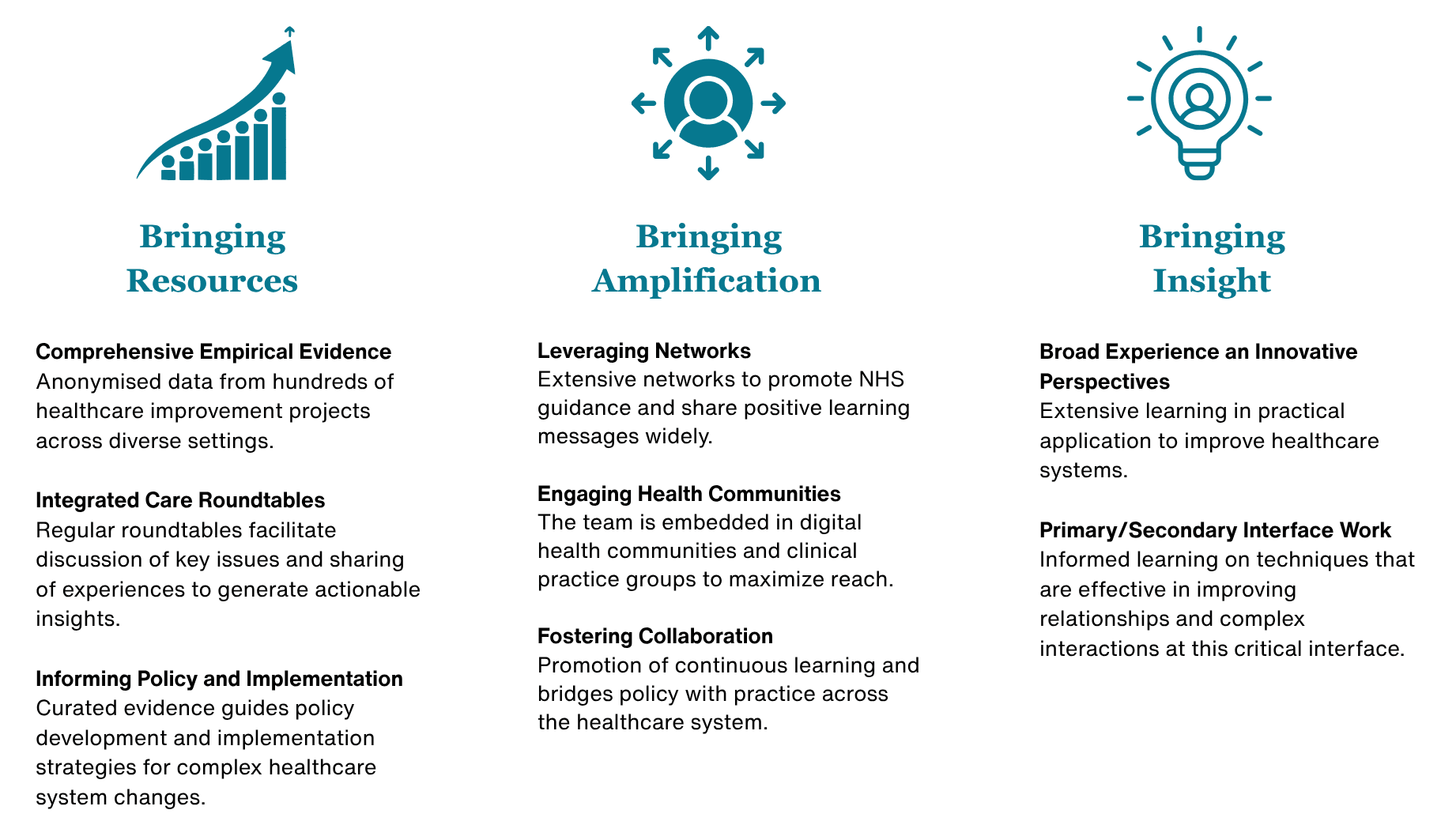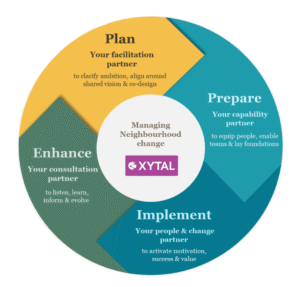Supporting Neighbourhood Teams to Deliver Integrated, Personalised Care
Integrating Neighbourhood Teams
Each Neighbourhood is unique presenting a complex and diverse set of system challenges and opportunities.
- Issues might include: capacity gaps, skills gaps, inequitable provision, conflicted priorities, fractured relationships, interoperability hurdles
- Prospects might need: objective evaluation, modelling for scaling, procedural testing, quality assurance, extended governance structure
- Management might take: strategic advisory, project management, communication input, risk stratification, compliance, output co-production
Why Xytal?
Investing in Leadership. Realising value from digital. Developing effective interfaces.
- Through our work modernising General practice, we are proud to be the only uninterrupted approved national NHS delivery partner since the first inception of Primary Care process improvement scheme, currently operating as PLS.
- Facilitating digital change has inevitably become a universal aspect after more than 400 programmes. We help teams discover meaningful benefits that drive change. From going online through to total triage, automated workflow and AI scribes
- Work to improve relationships across parts of the system. Leadership programmes that bring back understanding and regenerate effective collaboration. We have been working in this capacity at all levels across the system from local groups through to regional Primary-Secondary interfaces
4 Stages of managing change
With general practice as the cornerstone to Neighbourhood health, we have extensive track record and refined solutions. To illustrate where our support can strengthen your programme, we’ve split change into 4 stages to manage.
Planning stage
Your ‘facilitation’ partner to flex as required
- Baselining: Analysis, mapping assets, defining current operational state
- Alignment: Scoping with guidance, budget, constraints, contingency
- Risk: Assessing scenarios, validating dependency, critical path & mitigation
- Tracking: Progress, performance quality metrics to monitor workstreams
- Accountability: Responsibilities, engagement framework, scorecards
- Assurance: Clinical review, operational input, governance advice
- Co-production: Structure, workshop content, constructing agreement criteria
- Resourcing: Boosting workstreams with ad-hoc expertise when required
- Review: Assessing draft plans and recommending improvements
Preparation stage
Your ‘capability’ partner to lay right foundations
- Repairing seams – mending fractured boundary relationships to restore function
- Empowerment – equipping key actors with tools and leadership capability
- Incentivisation – exploring nudges, push and pull factors to accelerate impact
- Pilot tests – recalibrating for impact, possible compromise & backup positions
- Communication – compelling narrative on value of change that works on all levels
- Prioritising – pinpointing critical facilities and digital dependencies to handle change
- Programme management – Supporting activities in advance of change
- Review – assess preparation, revisit risks of starting change and final recommending
Implementation stage
Your ‘change management’ partner to unlock motivation, value and success
- Value discovery: Personalising benefit from team perspective to motivate progress
- Integrating teams: Shared identity, viable structures, practical workflow, common goals
- Digital risks: Assessing where both people-related resistance/failure/weakness
- Training: Competency, scenario, coaching and action learning options
- Best practice transfer: Accessing evidence base to source right answers fast
- Process improvement: Ensuring efficient, integrated process, troubleshooting
- Configuration: Addressing snags or concerns, optimising, plugging gaps
- Resourcing: Boosting workstreams with ad-hoc expertise when required
Post implementation stage
Your ‘optimisation’ partner to build on what has been attained
- Post implementation review: Business case, budget, resource utilisation, lessons
- Analysis: Deconstructing function & benchmarking comparative input and output
- Optimisation: Targeting rework, waste and missed value – prioritised by impact
- Remediation: Actively recovering aspects of change that haven’t worked
- Productivity: Reviewing workflow to baselines and identifying outliers
- Sustainability: Identifying ways to build on shifts with automation & CQI
- Evaluation: Post programme assessment of return on investment vs business case
How Xytal Supports the Neighbourhood Community
As an employee-owned B-Corp, we’re passionate about supporting communities to thrive. You’ll find us sharing ideas and learning on the LinkedIn Neighbourhood forum, led by NHS Horizons team, helping to shape and improve Neighbourhood models in practice.

Further Reading
Multidisciplinary Team (MDTS) – What does effective collaboration look like?
Explore our news and insights to see more of what we do for Multi Disciplinary Team (MDTS), System interfaces, and Neighbourhood Collaboration.

Neighbourhood Feedback
If you’d like to explore ways we can support your Neighbourhood work, or simply share experiences and compare notes, please don’t hesitate to get in touch.
We look forward to hearing from you.







